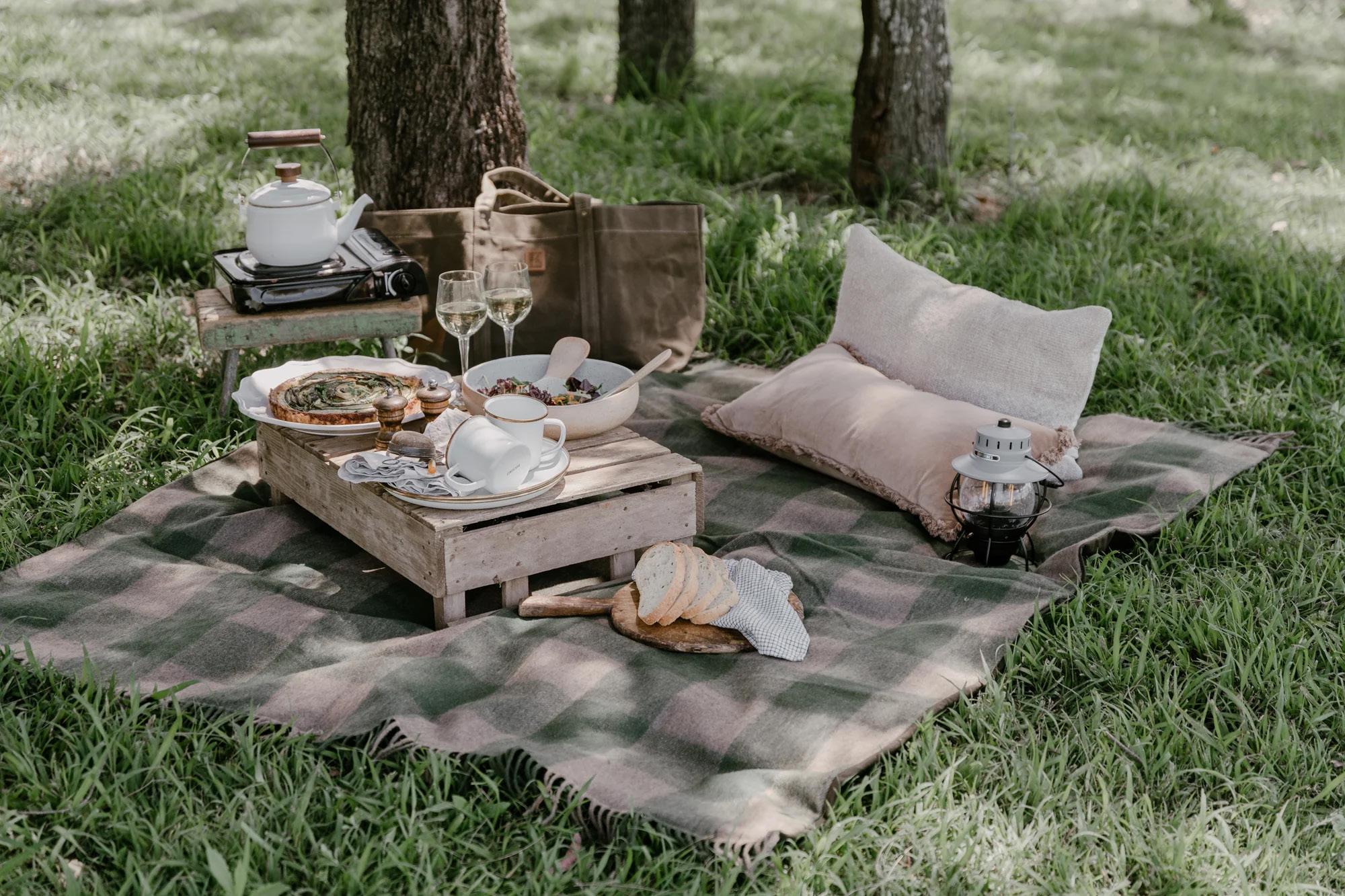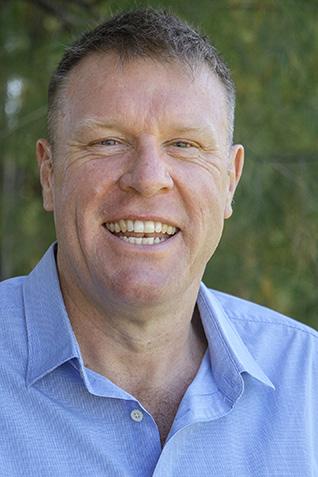
7 minute read
Rev. Simon Hansford | Moderator

It’s where the real conversations happen, where the decisions are made and the relationships are formed. It’s where many of the stories are told (and where many of the stories begin); it’s where the meals are eaten, and the wine is shared.
It’s where we learn to be in relationship, when they are wonderful, and difficult, and sometimes even broken.
It stands at the heart of the sanctuary and remains one of the essential stories of our faith - that Jesus, on the night before he died, shared a meal with his friends.
The table is a vital part of our shared life, whether it is the picnic rug spread on the paddock, or the camping table unfolded (remember those old table and chair combos, when you always risked losing a finger in the opening and closing?), or the polished dining table with all the regalia, or, most commonly, the kitchen table after the kettle has come to the boil.
It is no surprise that Jesus spent a good portion of his time sharing meals with people; around a table we relax and tell the stories we need to tell, and to hear. Please note that I am not talking about a “desk”, where power is apportioned and jobs are done, and people often sit in opposition.
A friend of mine, of Chinese heritage, espouses the inherent community of a round table, as opposed to one with a “head” and presumably a “foot”. This is where we all sit in equality, both of welcome and of access to food and drink!
I am reminded, as I write this, of our Church’s insistence that there I always room at the communion table for anyone who is hungry; there is always room in the heart of God for everyone, broken and whole.

At the table, we give thanks for the generosity of God, for the generosity of friends, and for the hands who have prepared the meal we are about to share. We are mindful too, of those who do not have food, or justice, or a table at which to share.
Our table. A place of hospitality, of generosity, or blessing and of justice.
All are welcome.
Nathan Tyson | Director, First Peoples Strategy and Engagement

Yaama, hello again! Thanks for reading Ruminationsthis edition has the theme of “table”.
For those who know my work, you will know I have been doing a lot of speaking across the Synod about the Voice to Parliament. When I heard the theme “table”, I immediately thought of the Voice… which I see broadly as “a seat at the table”. I will explain my thoughts below.
As Christian’s, our table should always be open to those in need: Those who need refuge; those who need something to eat; and/or, those who need somebody to talk to. Jesus taught us about inclusion, welcoming Gentiles into his teachings, and offering salvation to all. All Christians should reflect this teaching in our interactions with people – it is our purpose to love and to include, not to judge and exclude. I’m not suggesting non-judgemental inclusion is easy, in fact I know it sometimes isn’t, but as Christians it should always be something we strive for. We should remind ourselves to “love our neighbour” regularly. It is not a silly thing to pause in moments of challenge, and think “What would Jesus do?”. This is how we ground ourselves in our faith and keep ourselves centred on ensuring God’s will “is done on Earth as it is in Heaven”.
Which brings me to talk about the Voice to Parliament. There is a lot of misinformation being spread about the Voice, sadly with the intention of creating unnecessary confusion and fear. Let me try to briefly explain what the Voice is about, as it is my experience that when people understand the purpose of the Voice, they feel much more comfortable with the idea.
Having read widely about the Voice, through a lens of 30 years of advocacy for the rights and interests of First Peoples, I want to reassure readers that the Voice is simply an advisory body. A body that will consult with local Aboriginal and Torres Strait Islander communities across Australia to identify issues that are important to them, that will consult to identify constructive solutions to issues of disadvantage impacting those communities, and that will convey these issues and suggestions, in the form of advice, to the Government and Parliament.
Quite simply, the Voice is about First Peoples being able to provide constructive advice to the Government and the Parliament to help address the entrenched and endemic socioeconomic disadvantage that is impacting our communities, families and family members.
The Voice to Parliament is about establishing an advisory body, consisting of Aboriginal and Torres Strait Islander people, chosen as representatives by their community, to represent the views and interests of their communities, through the provision of advice to the Government and Parliament. Just advice. The advice will be “nonbinding”. The Voice body will have no power to force the government or the Parliament to make any particular decisions. The Voice body will also have no power of veto. The Voice body will have no power to override or cancel the decisions of the Government or Parliament. The Voice will not undermine our democracy, or Parliamentary processes. Parliament will continue to operate as it always has (just with the option of listening to advice from First Peoples about matters that affect us).
So what is the point of this “advice”? The purpose of the Voice body, and the advice it will offer, is to help to address the entrenched and endemic disadvantage that continues to impact the lives of First Peoples and communities – to make a positive difference in the lives of disadvantaged people, families, and communities.
Socio-economic data (for example that recorded by the Productivity Commission and included in the annual “Closing the Gap” Reports) shows that efforts by Government and Parliament over the past three decades have not managed to substantially “close the gap”. First Peoples and communities continue to experience significant socio-economic disadvantage compared to nonIndigenous Australians. The status quo, the approach taken for the last three decades or more, is clearly not working. The result is that many of our First Peoples and communities continue to be excluded from the standards of health, housing, education and employment that are enjoyed by other Australians.
Australia is a great country, we are a “first world” country, we have enough for all to have enough. There is room at the table for everyone. Yet for some reason our First Peoples remain structurally excluded from Australia’s socio-economic table.
So how do we invite our First People to the table in a way that will help address known structural challenges? One way, in my view, is through providing a means for First Peoples to be able to provide advice into the development of laws, policies and programs that impact our lives. It is through providing First Peoples with a Voice. It is through supporting the Yes vote in the upcoming referendum.

When I speak to congregations, I often refer to Mathew 25:31-46, a passage where Jesus very clearly tells us that, at the end of our days, we will be judged on how we have treated the least. Jesus warns us that in order to enter the Kingdom we must have treated those suffering disadvantage the same way we would treat Jesus if he were suffering the same plight.
Regardless of whether you support the Voice or otherwise, I challenge you to think about how you respond to the issues of disadvantage that continue to impact the lives of Aboriginal and Torres Strait Islander peoples. Walking past the injured person on the road is not loving our neighbour. Doing nothing in the face of injustice is not following the teachings of Jesus.
Jesus did not teach us to walk the path of least resistance, the easy path, or the comfortable path. Jesus taught us to stand with the poor, the weak, the marginalised and the oppressed – and to invite them to the table. The Parable of the Great Banquet (Luke 14:15-24) is a good example of this. Jesus also never said “Only invite them to your table if they are going to agree with you”, and we know Jesus often sat at tables giving advice to those in power in the hope they would listen.
Is Australia’s table open to hear the voices of our First Peoples? We will find out later this year.
If you would like to access information about the Voice, or watch a video of me talking about the Voice, please visit: https://www.nswact.uca.org.au/social-impact/first-nations-resources/
Kirsty Baker | Lay Minister, Holy Cross Tuckerbox

The table is a wonderfully versatile piece of furniture. Many different activities can happen – homework, craft, a catch-all for clutter, jigsaws, games, a desk, food preparation … For most of us it is a core place of hospitality.
The table is where we come together to share food, companionship and connection. How many memories do you have of occasions around the table? Sunday roasts, Christmas, birthdays? Clearing a meal followed by cards or games? A cuppa with laughter, tears, great conversations?
Food is central to celebrations and gatherings . Jesus’ first recorded miracle is converting the water into wine at the wedding feast in Cana, there are two miracles feeding thousands of people, the last supper, the feast prepared for the prodigal son. The Gospels tell of Jesus sharing table with those who are close to him. More importantly it also tells of him sitting with the outsiders, the socially unacceptable, the unclean, sinners. How good are we at inviting people who are different to us to our table?
For a short while in the 60’s, my maternal grandparents were live-in caretakers of a church in Chelmsford, Essex. One night, at Christmas time, my Gran invited a transient person in for some warmth, food and hot tea. Apart from the quick placement of a newspaper on the chair by my grandfather, this man received the same care as any other visitor. He left with a full stomach, some extra food and hopefully feeling that someone still cared about him. Gran never led me to believe this was an all rose-coloured story and the offering of hospitality was an easy thing to do. For inviting people on the fringe can be very uncomfortable and confronting.
My grandfather whisked around with disinfectant after their visitor’s departure. He had shared table with a stranger but he was challenged by the aroma of his guest. (My grandmother was very pleased he managed to disguise this during the visit.)
The offering of a drink or food to visitors and guests is how we show a person is welcomed and honoured.
It how we serve God’s people by showing they are valued.




